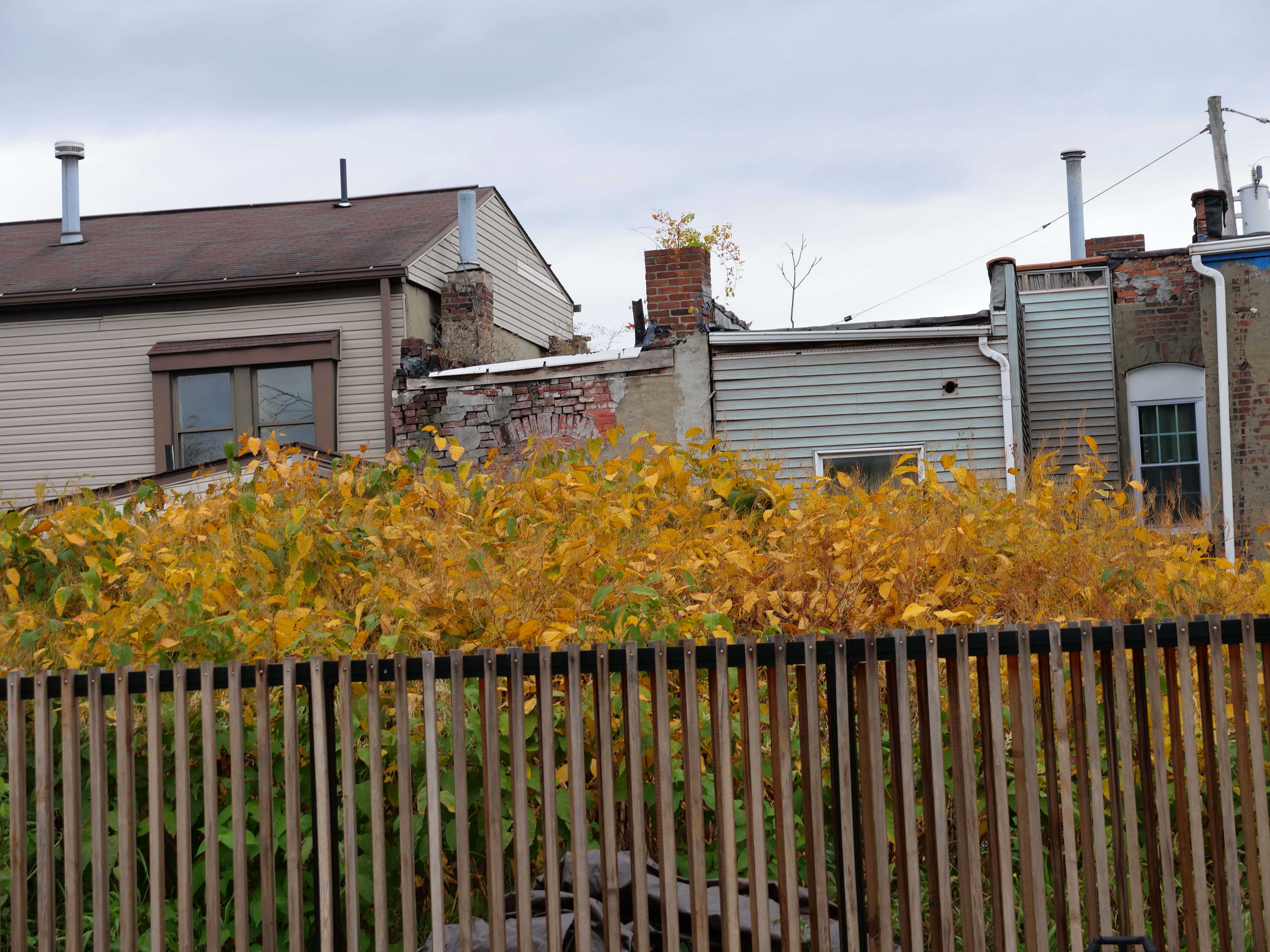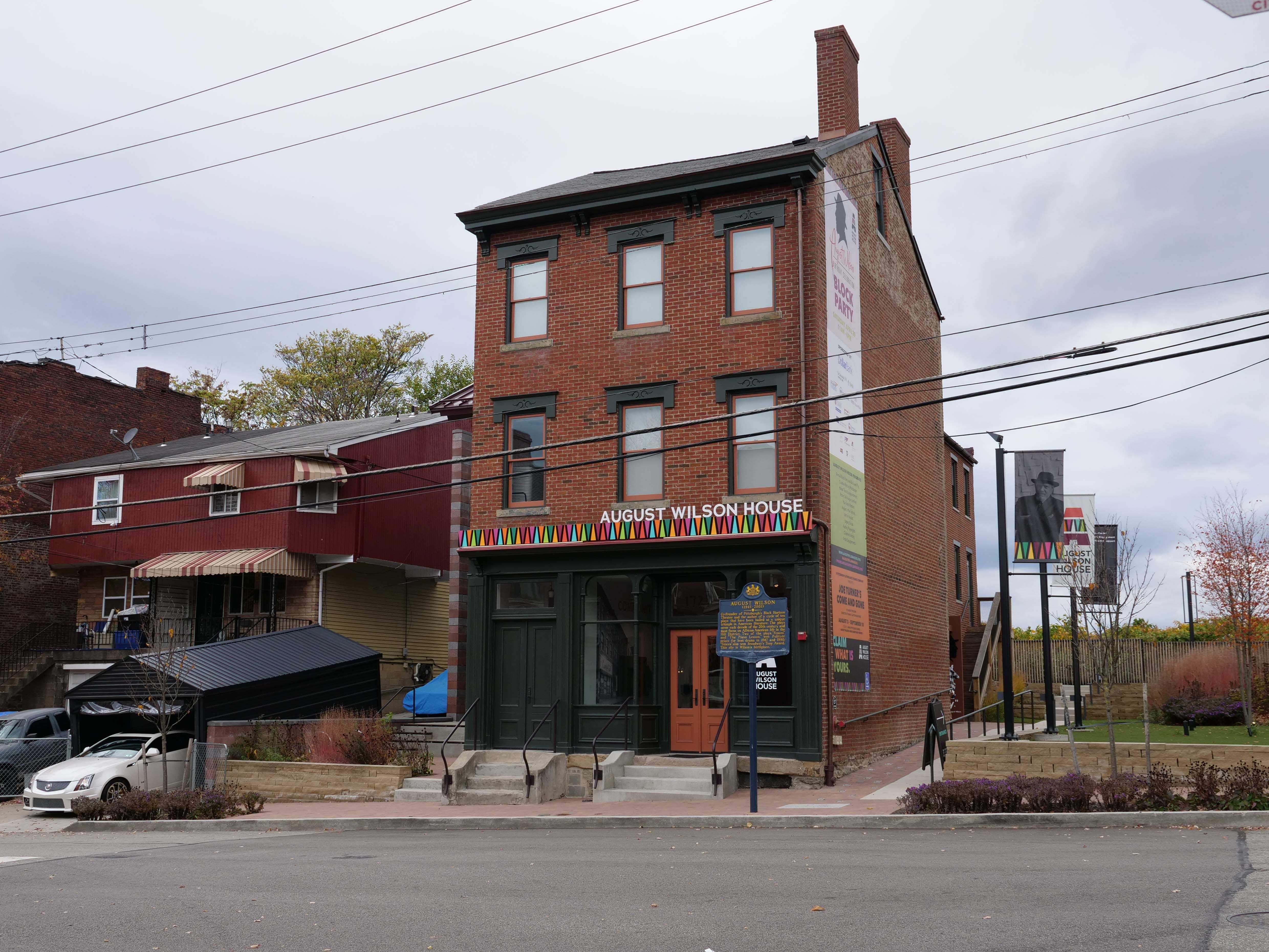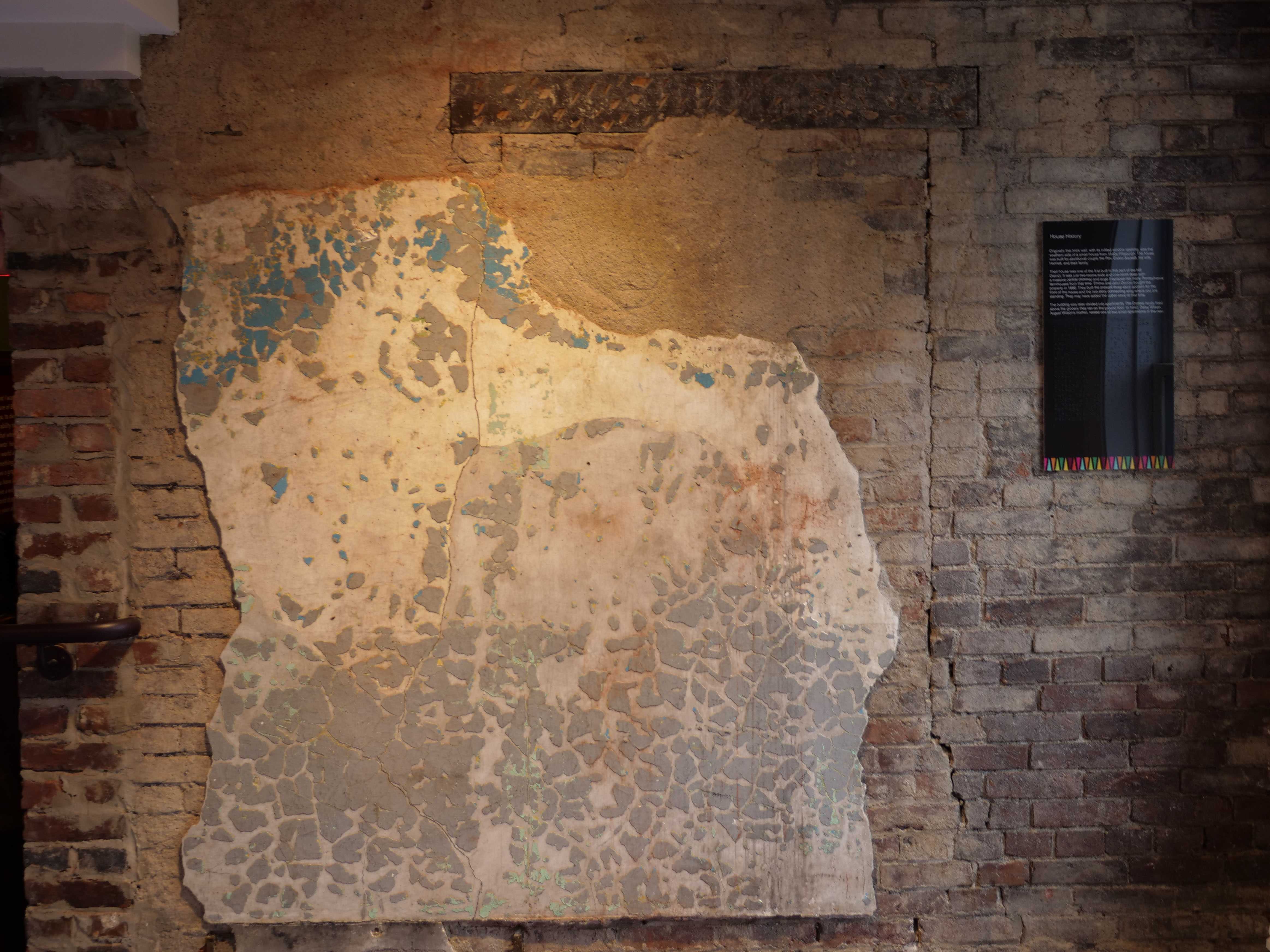Secret Pittsburgh
The Hill's Hidden Histories and Lasting Legacies
By Lauren Myers, Kelsey Shuck, Mazin Al-Ghanami, and Zoya Arebamen
This page contains the transcript, show notes, and sources for the seventh episode of the Secret Pittsburgh Podcast, Season One . To listen to the episode, as well as the rest in the series, visit our SoundCloud.
Transcript
Zoya: Hello! Welcome to Secret Pittsburgh! In the past 15 weeks, we’ve traveled across the city, learning the stories of Pittsburgh’s people and places. I’m Zoya and in this episode, “The Hill’s Hidden Histories and Lasting Legacies,” we will explore August Wilson’s former neighborhood, the Hill District, and his childhood home.
August Wilson was never able to witness the transformation of his childhood home into a landmark as he passed away in October of 2005 and the house had its grand opening in August of 2022. During our class tour of the August Wilson House, it became evident that significant support and care had been invested in creating the community space it is today.
The route to the entrance to this house is laid with bricks adorned with the names of contributors, including beloved actor, Denzel Washington—a symbolic representation of how donors helped construct the path to bring August Wilson’s vision to realization. The mission of the August Wilson House is to celebrate the literary and personal legacy of August Wilson. Also to serve as an arts center to nurture the historic Hill District community and arts and scholars influenced by his work. A fitting mission, considering August Wilson’s dream for his childhood home was not to become a mere museum, but a functional space that invited creativity and nurtured future artists in the neighborhood he grew up in. “It was on these streets in this community in this city that I came into manhood and I have a fierce affection for the Hill District and the people who raised me,” said August Wilson.
The Hill District is not just the home of the famous playwright; it remains a vibrant community that many call home. We had the privilege of speaking with Dr. Ervin Dyer, an acclaimed news journalist and storyteller who’s known for his coverage of African-American life and culture. Dr. Dyer had some insight into the Hill District’s history.
Dr. Dyer: And when he grew up here, he was born in 1945. The Hill at that point was a very cosmopolitan community. There were Jews, Italians, Syrians, African Americans, and other people living here all together, right? A mix of incomes, a mix of professionals. It was a dynamic, vibrant space. August Wilson’s family didn’t have a lot of money. But the hill that he came into was a place that was known as a crossroads of the world.
Zoya: To gain a better understanding of the backdrop that influenced his work, let’s get into the history of the neighborhood to the present day. People began migrating to the Hill District in the early 1910s from various parts of the United States. In a lot of cases, those moving were a part of the Great Migration from the rural American South. The Hill attracted people from around the globe as well. The African-American population in the neighborhood increased from around 10,000 in 1890 to 37,000 by 1920. With increased residents and a system of segregation, housing for African Americans moving to Pittsburgh was almost entirely limited to the Hill District. The area was vibrant with life in the years leading to World War I. Black businesses thrived in the Hill. There were several nightclubs, bars, restaurants, shops, and markets. The sound of jazz could be heard from all over, making the Hill known for its musical culture. Much later in history, August Wilson would recognize the importance of jazz, drawing inspiration from its unique storytelling qualities.
The Hill District, once a vibrant cultural center, faced the first wave of unwelcome changes in the mid-1950s. A substantial area fell under plans for redevelopment, leading to the displacement of around 8,000 people. Currently, the University of Pittsburgh is taking over the Hill District, with the athletic fields in Petersen Sports Center replacing the Robinson Court public housing.
Like so many buildings in the Hill District, August Wilson’s childhood home became depleted and abandoned overtime. The process was long and expensive. Dr. Dyer, a Hill District native himself, who serves as a board member at the Wilson house, gave us insight on the multimillion restoration process.
Dr. Dyer: By the time that it was decided that the house could be developed into the August Wilson House as a sort of community art center. Oh, it was in really, really bad shape. And so we had to first do the work of shoring up the house, fixing the roofs, doing some structural things to hold it together so that it wouldn’t further deteriorate, so that we could begin the process of restoration and redevelopment. That took about a decade or more to do because we had to raise funds. It convinced people of the importance of saving the structure and the story that was there. And because the house was so damaged, it was a lot of work bringing it back to life and making it what it is today.
Zoya: Through the work of Dr. Dyer and colleagues and donations from Denzel Washington and the community, the August Wilson House is now a protected historical landmark. The vision of Wilson and the House board members is to nurture and curate an artistic community to help regenerate the Hill, and they do this through financially supporting artist fellowships and hosting Wilson’s plays for the community with the house as the location.
Dr. Dyer: We have student groups like your age come to the house. We’re developing a curriculum there as part of our programming that reaches out to high school students. So I haven’t seen a lot of high school students come to the House. We do have an annual block party, and that's family-centered, so for a day in April around August Wilson’s birthday, which is April 27th, we do hold a block party.
Zoya: But Wilson’s home isn’t the only place in the Hill District where residents are fighting for the protection of the community and its legacy. Dr. Dyer shared this:
Dr. Dyer: The historic hill is a very desirable space, right? It’s very scenic. It’s close to downtown. It’s close to Oakland. So there’s a lot of people who see that property and that area as having value. There’s also a cultural and spiritual history that exists in the Hill that is worth protecting. And I think that is the work that you see of so many people who live in the Hill now is wanting to protect that history, that cultural history, that spiritual history, so that it’s not all sort of bulldozed over as if there was nobody there and if there was no history before the redevelopment came. So while in one hand, it’s wonderful to see the properties and everything redeveloped, I think we do want to see a place where it’s developed for all, and where the history of all the people who live in the Hill is appreciated and understood because it was not just a dead space when Black people lived there. There were people who were creative and business people and spiritual leaders and artistic people, and the Hill was very vibrant. And so it’s important, I think, for the people to consider that history. And the other thing that I really think is important, right, is like, you see so much activism because of the history that is a part of the Hill. At one point, the Hill District was known as little Haiti because the people in the Hill District so identified with the Abolitionist movement and the sense of independence that was coming out of a newly freed Republic that was Haiti.They so identified with that, that they call themselves little Haiti. And what I always argue is that this sense of self determination, this spirit of independence, this desire to be free and self determined really became this sort of intellectual architecture for the Hill, and that never died out, that it shows up in how the people continue to fight to create self determination and free spaces for themselves today. Yeah, I think people see themselves as guardians, right? I think they see themselves as guardians and caretakers for this rich cultural history for this rich political activism that was part of the Hill’s history. I think they see it as building a new community and a better community, safeguarding some of the creative spaces that have been a part of the Hill, recognizing the legacy and the history of the people who lived there who came before them. And so I think that’s really a lot of the work that we see going on with, with the development that recognize this sort of contribution of all the people of the Hill. And especially recognizing that many of these contributions came from people who identified as African American.
Zoya: Pittsburgh at times has been overshadowed by the history of the steel industry and the exploitation of its workers by the well-known names of Andrew Carnegie and Frick. Wilson focused on telling the story of the complex lives of people that lived in the Hill District.
Dr. Dyer: So Mr. Wilson became a storyteller, right, but he got his value of what stories could do from his mother. The stories of her work as a domestic in Pittsburgh and the challenges involved with that. But also the stories of her neighbors who worked as domestics. The story of the African crossing into the Americas. She would share all that with them. And because of those stories, Mr. Wilson developed a sense of pride and understanding of his people and his community and strongly identified with that.
Zoya: August Wilson continues to influence Pittsburgh through the archives of his effects, acquired by the University of Pittsburgh’s Hillman Library. August Wilson’s archive contains fan mail, the journals he kept throughout his writing career, playbills, and other personal effects that the University bought from his widow and his estate. We had the privilege of speaking with Diael Thomas the Outreach and Engagement Curator for the August Wilson Archive within the University Library System who gave us insight into her role as an archivist and how the archive continues to educate people on Wilson’s legacy.
Diael Thomas: My role is focused out in the community. So we run paid programs from several large grants that we have for high school students, for high school and middle school teachers, for artists, and then for other general researchers. We were lucky enough to receive a 1 million dollar grant from the Hillman Foundation to do all this community outreach, because we recognize that the Wilson Archive had really important cultural and sociological importance in the region. I think that it’s been really powerful for the Hill District and for other Black residents to see their community and their culture elevated to this level. For them to be able to see, like, their everyday life brought to the stage and to really be seen as art and something worthy of talking about. A lot of the people that I talk to in this work, like, they are proud to be from the Hill District, and they’re proud of Wilson and what he accomplished.
Zoya: Over 15 years after Wilson’s death there is still an effort to keep his legacy alive within the Hill District community and in Pittsburgh. The archives are a great resource for those who want to learn more about Wilson as it showcases not only August as a beloved writer but also August as a brother, husband, and foremost, a person. At the time of his death, Wilson had collected over 400 boxes worth of personal memorabilia, such as pictures of his family and siblings. As Wilson was the first of 5 siblings to pass away, there is an effort by his loved ones to keep not only his writings alive but also his memory.
My group member Kelsey who served as the scholar for this episode had the opportunity to visit the archives and is here to share what her experience was like.
Kelsey: My experience visiting the August Wilson Archives could be summarized as straightforward and informational. I scheduled a time to read over the materials I requested on the website and when I got there, everything was set up for me. The researchers working on the Archives were extremely helpful and went out of their way to make sure I was getting the material I needed. I will say, though, for those interested in checking out August Wilson’s notebooks, his handwriting is a bit difficult to read, which makes sense. I definitely don’t write neatly in my own personal notebooks. I instead focused on the fan mail he received. It ranged from a 3rd grader asking for advice on a project, a woman berating him for his representation of African-Americans, tons of praise and requests to meet, and surprisingly a great deal of letters asking him to quit smoking.
Zoya: Thanks so much for sharing that Kelsey. And to our listeners, if you’re ever interested in checking out the August Wilson Achieve yourself, it can be found on the 3rd floor of the University of Pittsburgh Hillman Library or visit its website at augustwilson.library.pitt.edu.
Before we close this episode, it’s imporant to note that Wilson stayed true to his humblest beginnings. Even through all his success, Wilson always made time to come back home. It’s often said that Wilson would be spotted walking around the Hill District, unnoticed by some as even through his fame, he still blended in with people he grew up with.
Dr. Dyer: He would come home frequently because most of his family was still here. His mother was here. And even when his plays started becoming successful, he would come back to help his family. And I know that when his plays were being performed here, he would sneak into town, and sit at the back of the theater and just watch the audience’s reaction to his plays. I mean, if you knew him, you knew him. But if you didn’t, he just folded right into the fabric of the Hill. So he could listen, and he could hear, and he could capture people’s stories. And I just thought that was just amazing that he was able just to be so invisible and yet be so magnificent. So that’s one of my favorite memories is how he folded himself into the fabric of the community. And so he stayed very connected to Pittsburgh. So although he left to find his way as a writer, Pittsburgh never let him. One of his greatest inspirations was that the stories matter, right? You know, you sometimes think, oh, that’s not the story, who cares about those people? You go see his play. You hear him speak about the value of stories and his own experience, his mother's experience, and, say hmm, it does matter, I'm gonna tell this story. So yeah, just a reinforcement that everybody has a story and they matter. There’s a quote, let’s see if I can remember it, that Wilson uses: “Writing is like a journey across the landscape of the soul.” So it was something that was deeply personal. And because he was writing so much about the Hill District, he continued to cross that landscape. It remained a part of his soul, because those are the stories he told was about Pittsburgh people.
Zoya: Once again, thank you for joining us as we uncovered one story of the August Wilson House and the Hill District. We hope you are inspired to visit this place and to find your own Pittsburgh stories. Please tune in to all the episodes we’ve produced this season. You can find show notes and a transcript at secretpittsburgh.org. This episode was hosted and written by me, Zoya Arebamen, and my group members Mazin Al Ghanami and Lauren Myers who served as the audio editors, and Kelsey Shuck who also wrote and researched this episode. Thanks for listening!
Show Notes
If you are interested in learning more about the August Wilson House, you can check out their website, and schedule a visit or attend an upcoming event.
Also check out the August Wilson Archive online or at the University of Pittsburgh's Hillman Library where you can schedule a visit and request materials with 48 hours advance notice.
Bibliography
August Wilson House, http://augustwilsonhouse.org.
“August Wilson: The Ground on Which I Stand ~ August Wilson's 10-Play Cycle: Scenes and Synopses.” PBS, Public Broadcasting Service, 23 Dec. 2020, https://www.pbs.org/wnet/americanmasters/august-wilson-the-ground-on-which-i-stand-scenes-and-synposes-of-august-wilsons-10-play-cycle/3701/.
Bill Moyers, “August Wilson’s America: A Conversation with Bill Moyers,” American Theatre 7.6 (1989): 14.
Bogumil, Mary L. Understanding August Wilson. The University of South Carolina Press, 2011.
Dial, Thomas. Personal Interview. 3rd November 2023.
Dyer, Ervin. Personal Interview. 7th November 2023.
“Find Any Sound You Like.” Freesound, https://freesound.org/people/-CASK-/sounds/623288/. Accessed 25 Nov. 2023.
“Find Any Sound You Like.” Freesound, https://freesound.org/people/-CASK-/sounds/623286/. Accessed 25 Nov. 2023.
“Find Any Sound You Like.” Freesound, https://freesound.org/people/camel7695/sounds/577085/. Accessed 25 Nov. 2023.
“Find Any Sound You Like.” Freesound, https://freesound.org/people/camel7695/sounds/577085/. Accessed 25 Nov. 2023.
“Find Any Sound You Like.” Freesound, https://freesound.org/people/Migfus20/sounds/559850/. Accessed 25 Nov. 2023.
“Find Any Sound You Like.” Freesound, https://freesound.org/people/leytos/sounds/251000/. Accessed 25 Nov. 2023.
“Find Any Sound You Like.” Freesound, https://freesound.org/people/Danskin54/sounds/344624/. Accessed 25 Nov. 2023.
The Hill District (Pittsburgh, PA), a story, https://aaregistry.org/story/the-hill-district-pittsburgh/.
Zach Cene, “August Wilson House,” Hill District Digital History, accessed October 26, 2023, https://hillhistory.org/items/show/15.


